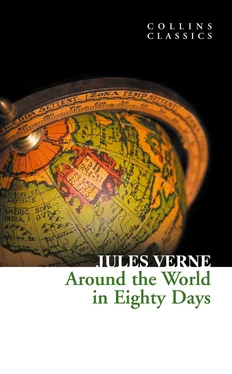As scientists did not understand earth dynamics until the latter half of the 20th century, it was conceivable at the time that one could dig to the centre of the planet, just as his characters do in Journey to the Centre of the Earth. Similarly, in From the Earth to the Moon he has his characters employing a canon to fire them to the moon. This wouldn’t work on two levels. Nevertheless, Verne did anticipate space flight, the submarine, mechanical flying machines, tunnelling machines and so on. Some of these were already in the embryonic stages of their development into operational and practical devices of course, although it is not entirely clear whether Verne knew about any of them or was genuinely basing his ideas on original thought.
No matter, for Verne was a novelist, not an inventor and his application of science and technology was all about creating the necessary illusion to make the reader believe in the adventure. By the time anyone knew any better he and his readership were consigned to history.
Visit www.AuthorTracker.com for exclusive information on your favorite HarperCollins author.
Cover Page
Title Page
History of Collins
Life & Times
CHAPTER 1
CHAPTER 2
CHAPTER 3
CHAPTER 4
CHAPTER 5
CHAPTER 6
CHAPTER 7
CHAPTER 8
CHAPTER 9
CHAPTER 10
CHAPTER 11
CHAPTER 12
CHAPTER 13
CHAPTER 14
CHAPTER 15
CHAPTER 16
CHAPTER 17
CHAPTER 18
CHAPTER 19
CHAPTER 20
CHAPTER 21
CHAPTER 22
CHAPTER 23
CHAPTER 24
CHAPTER 25
CHAPTER 26
CHAPTER 27
CHAPTER 28
CHAPTER 29
CHAPTER 30
CHAPTER 31
CHAPTER 32
CHAPTER 33
CHAPTER 34
CHAPTER 35
CHAPTER 36
CHAPTER 37
CLASSIC LITERATURE: WORDS AND PHRASES adapted from the Collins English Dictionary
Copyright
About the Publisher
In which Phileas Fogg and Passepartout accept each other—the one as Master, the other as Servant
In the year 1872, the house No. 7 Saville Row, Burlington Gardens—the house in which Sheridan died, in 1814—was inhabited by Phileas Fogg, Esq., one of the most singular and most noticed members of the Reform Club of London, although he seemed to take care to do nothing which might attract attention.
This Phileas Fogg, then, an enigmatic personage, of whom nothing was known but that he was a very polite man, and one of the most perfect gentlemen of good English society, succeeded one of the great orators that honour England.
An Englishman Phileas Fogg was surely, but perhaps not a Londoner. He was never seen on ‘Change, at the Bank, or in any of the counting-rooms of the “City.” The docks of London had never received a vessel fitted out by Phileas Fogg. This gentleman did not figure in any public body. His name had never sounded in any Inns of Court, nor in the Temple, nor Lincoln’s Inn, nor Gray’s Inn. He never pleaded in the Court of Chancery, nor the Queen’s Bench, nor the Exchequer, nor the Ecclesiastical Courts. He was neither a manufacturer, nor a trader, nor a merchant, nor a gentleman farmer. He was not a member of the Royal Institution of Great Britain, or the London Institution, or the Artisan’s Association, or the Russell Institution, or the Literary Institution of the West, or the Law Institute, or that Institute of the Arts and Sciences, placed under the direct patronage of Her Gracious Majesty. In fact, he belonged to none of the numerous societies that swarm in the capital of England, from the Harmonic to the Entomological Society, founded principally for the purpose of destroying hurtful insects.
Phileas Fogg was a member of the Reform Club, and that was all.
Should anyone be astonished that such a mysterious gentleman should be among the members of this honourable institution, we will reply that he obtained admission on the recommendation of Baring Brothers, with whom he had an open credit. Thence a certain appearance due to his cheques being regularly paid at sight by the debit of his account current, which was always to his credit.
Was this Phileas Fogg rich? Undoubtedly. But the best informed could not say how he had made his money, and Mr Fogg was the last person to whom it would have been proper to go for information. He was by no means extravagant in anything, neither was he avaricious, for when money was needed for a noble, useful, or benevolent purpose, he gave it quietly, and even anonymously. In short, no one was less communicative than this gentleman. He talked as little as possible, and seemed much more mysterious than silent. But his life was open to the light, but what he did was always so mathematically the same thing, that the imagination, unsatisfied, sought further.
Had he travelled? It was probable, for none knew the world better than he; there was no spot so secluded that he did not appear to have a special acquaintance with it. Sometimes, in a few, brief, clear words, he would correct the thousand suppositions circulating in the Club with reference to travellers lost or strayed; he pointed out the true probabilities, and so often did events justify his predictions that he seemed as if gifted with a sort of second sight. He was a man who must have travelled everywhere, in spirit at least.
One thing was certain, that for many years Phileas Fogg had not been from London. Those who had the honour of knowing him more intimately than others, affirmed that no one could pretend to have seen him elsewhere than upon the direct route, which he traversed every day to go from his house to the Club. His only pastime was reading the papers and playing whist. He frequently won at this quiet game, so very appropriate to his nature; but his winnings never went into his purse, and made an important item in his charity fund. Besides, it must be remarked, that Mr Fogg evidently played for the sake of playing, not to win. The game was for him a contest, a struggle against a difficulty; but a motionless, unwearying struggle, and that suited his character.
Phileas Fogg was not known to have either wife or children—which may happen to the most respectable people—neither relatives nor friends—which is more rare, truly. Phileas Fogg lived alone in his house in Saville Row, where nobody entered. There was never a question as to its interior. A single servant sufficed to serve him. Breakfasting and dining at the Club, at hours fixed with the utmost exactness, in the same hall, at the same table, not entertaining his colleagues nor inviting a stranger, he returned home only to go to bed, exactly at midnight, without ever making use of the comfortable chambers which the Reform Club puts at the disposal of its favoured members. Of the twenty-four hours he passed ten at his residence either sleeping or busying himself at his toilet. If he walked, it was invariably with a regular step in the entrance hall with its Mosaic floor, or in the circular gallery, above which rose a dome with blue-painted windows, supported by twenty Ionic columns of red porphyry. If he dined or breakfasted, the kitchens, the buttery, the pantry, the dairy of the Club furnished his table from their succulent stores; the waiters of the Club, grave personages in dress-coats and shoes with swanskin soles, served him in a special porcelain and on fine Saxon linen; the Club decanters of a lost mould contained his sherry, his port, and his claret, flavoured with orange flower water and cinnamon; and finally the ice of the Club, brought at great expense from the American lakes, kept his drinks in a satisfactory condition of freshness.
If to live in such conditions is to be eccentric, it must be granted that eccentricity has something good in it!
The mansion on Saville Row, without being sumptuous, recommended itself by its extreme comfort. Besides with the unvarying habits of the occupants, the number of servants was reduced to one. But Phileas Fogg demanded from his only servant an extraordinary and regular punctuality. This very day, the second of October, Phileas Fogg had dismissed James Forster—this youth having incurred his displeasure by bringing him shaving-water at eighty-four degrees Fahrenheit, instead of eighty-six—and he was waiting for his successor, who was to make his appearance between eleven and half-past eleven.
Читать дальше












